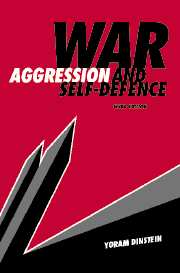Book contents
- Frontmatter
- Contents
- Introduction to the Third Edition
- From the introduction to the First Edition
- Table of cases
- Table of treaties
- Table of Security Council resolutions
- Table of General Assembly resolutions
- List of abbreviations
- Part I The legal nature of war
- Part II The illegality of war
- Part III Exceptions to the prohibition of the use of inter-State force
- Conclusion
- Index of persons
- Index of subjects
Introduction to the Third Edition
- Frontmatter
- Contents
- Introduction to the Third Edition
- From the introduction to the First Edition
- Table of cases
- Table of treaties
- Table of Security Council resolutions
- Table of General Assembly resolutions
- List of abbreviations
- Part I The legal nature of war
- Part II The illegality of war
- Part III Exceptions to the prohibition of the use of inter-State force
- Conclusion
- Index of persons
- Index of subjects
Summary
This is a completely updated edition of a book originally published in 1988 and revised in 1994. Since the end of the ‘Cold War’, although fears of a global cataclysm have considerably abated, the level of force and counter-force used regionally – in the Balkans, in the Gulf, in Africa and in other trouble spots – is constantly reaching new heights. Every additional conflict leaves its marks on international law. Each time the community of nations has to contend with flagrant aggression, the de facto response leaves normative (de jure) footprints in its wake. In broader terms, every major war becomes a crucible in which the jus ad bellum (just like the jus in bello) is tested and forged.
The third edition reflects recent judicial pronouncements of the International Court of Justice and the International Criminal Tribunal for Yugoslavia, the latest decisions adopted by the Security Council, the texts of new treaties (such as the Rome Statute of 1998 on the International Criminal Court), the current studies of the International Law Commission, as well as the exponential growth of the legal literature on the subject of the use of inter-State force. There are supplementary sections, about ‘humanitarian intervention’, enforcement actions beyond the purview of Article 42 of the UN Charter and the (still abstract) issue of invalid resolutions of the Security Council. Several other sections have been entirely rewritten, taking into account developments in the practice and theory of contemporary international law.
- Type
- Chapter
- Information
- War, Aggression and Self-Defence , pp. xiPublisher: Cambridge University PressPrint publication year: 2001



